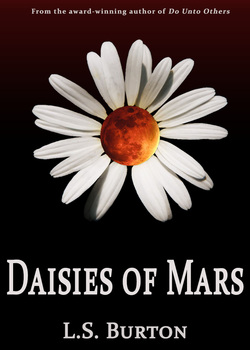"Mars was made wrong, and all in endless reds and blacks. A rusty car on blocks. The glowing embers of a dying campfire, Mars. A man could starve for the lack of greens and blues."

A quick read at 7429 words.
Nick stepped up onto a rock and proudly planted a solid print in the cinnamon soil on the other side. One small step for a facilitator ...
Nick Hutchinson hates Mars, and hates his new job as Earth Liaison.
One month down, five to go. Think of rivers, think of clouds, think of frogs and dresses in summer and umbrellas. Five months until antelopes, snowflakes, storm drains ...
But when he volunteers to venture out onto the inhospitable surface, hoping to convince a widowed hermit to sell her land to Friends of Earth Co., it's she who has the most to say, and he who had better listen.
Written to be read, and free to a good home.
Select your version on the left.
|
| |||||||||||||||||||||
About Daisies of Mars
This story came about when a friend challenged me to write a science fiction story as a bet for the Friends of Merrill short story contest. As usual, I doubled the allotted wordcount and forfeited the contest. But it was fun, so that's okay.
Though Mars is popular these days, and always in the news, writing a story about Mars that doesn't infringe on areas already flavored by the greats is next to impossible. The scientific material we're currently getting about Mars rides the wave of imagination established by A HUNDRED YEARS of stories about the planet, starting with H.G. Wells, peaking at Bradbury, and firmly achieving maturity with Kim Stanley Robinson.
On that note, it's very difficult to write about the colonization of Mars while sidestepping Robinson's rather sprawling, erudite, and epic shadow. So I decided the best course of action was not to try. Exercises in futility are not my forte.
So I laid my thoughts out about the inevitable trend towards privatizing space flight, and voila, Daisies of Mars. It's a trepidation that I think is valid, seeing that Virgin is building a space port in New Mexico and Google has lately invested in a company to take advantage of future asteroid mining.
Though Mars is popular these days, and always in the news, writing a story about Mars that doesn't infringe on areas already flavored by the greats is next to impossible. The scientific material we're currently getting about Mars rides the wave of imagination established by A HUNDRED YEARS of stories about the planet, starting with H.G. Wells, peaking at Bradbury, and firmly achieving maturity with Kim Stanley Robinson.
On that note, it's very difficult to write about the colonization of Mars while sidestepping Robinson's rather sprawling, erudite, and epic shadow. So I decided the best course of action was not to try. Exercises in futility are not my forte.
So I laid my thoughts out about the inevitable trend towards privatizing space flight, and voila, Daisies of Mars. It's a trepidation that I think is valid, seeing that Virgin is building a space port in New Mexico and Google has lately invested in a company to take advantage of future asteroid mining.
